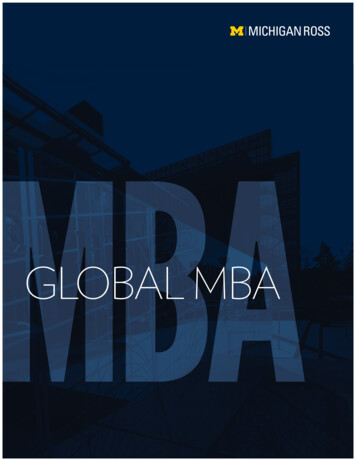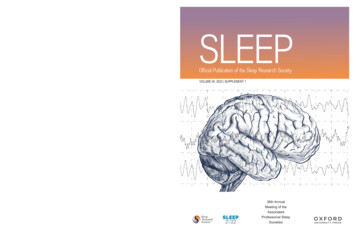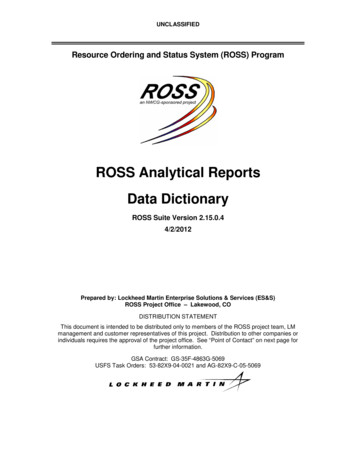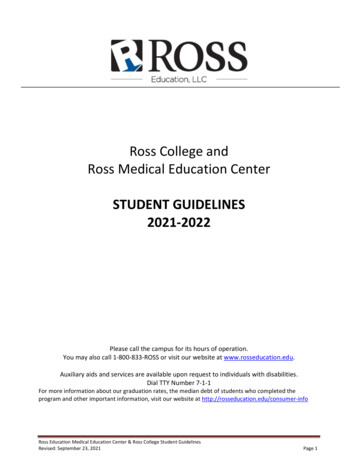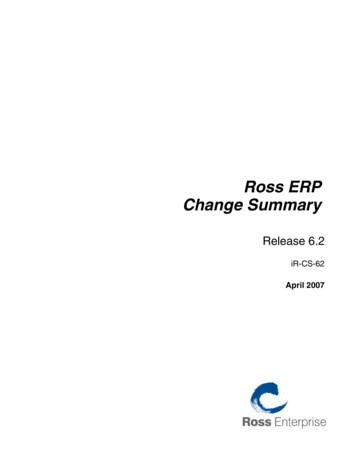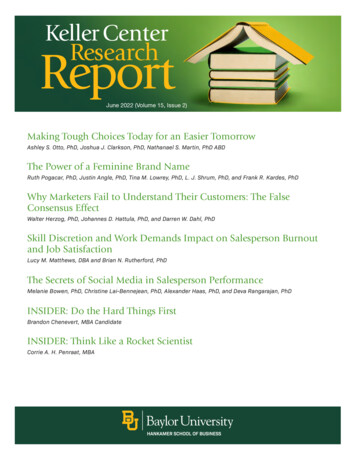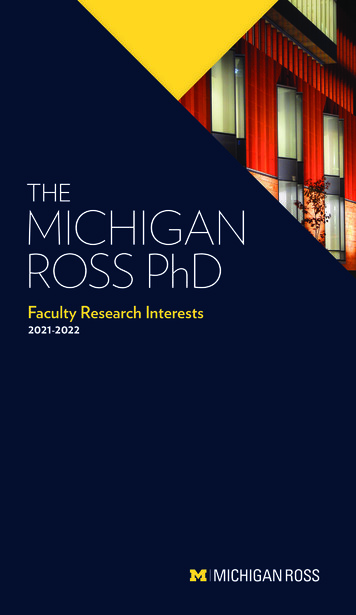
Transcription
THEMICHIGANROSS PhDFaculty Research Interests2021-2022
TABLE OF CONTENTSCONTENTS234681012AccountingBusiness & EconomicsFinanceManagement & OrganizationsMarketingStrategyTechnology & Operations1
AccountingBusiness & EconomicsVenky NagarHow managers communicate their view of the firmand its activities to outsiders.Interaction among firm strategy, organizational designand managerial accounting, and use of non-financialmeasures in performance evaluation.Ernst & Young Professor of AccountingLindsey GalloKPMG Professor of AccountingAssistant Professor of AccountingJames OmartianThe role of disagreement and uncertainty in capitalmarkets, the content of earnings, and the relationshipbetween firm-level and macroeconomic information.Assistant Professor of AccountingThe effects of regulation and the role of internalinformation in firm outcomes and external reporting.Raffi IndjejikianHeidi PackardCarleton H. Griffin-Deloitte and Touche LLP CollegiateProfessor of AccountingUse of managerial and financial accountinginformation in performance evaluation andmanagerial compensation, and agency theoryand its application to managerial accounting.Reuven LehavyVictor L. Bernard-PricewaterhouseCoopers LLPCollegiate Professor of AccountingFaculty Director, Paton Accounting CenterUsefulness of financial analysts’ price targets,stock recommendations, and earnings forecasts;firms’ use of accounting report discretion (earningsmanagement); and the interaction between analysts’earnings forecasts targets and firms’ reporting choices.Assistant Professor of AccountingExecutive compensation, corporate governance,and disclosure.Catherine ShakespeareAssociate Dean for Teaching and LearningArthur Andersen Professor of AccountingThomas P. Lyon // INTERIM AREA CHAIRDow Professor of Sustainable Science, Technologyand CommerceProfessor of Business Economics and Public PolicyProfessor of Environment and Sustainability, SEASCorporate environmental information disclosure,greenwashing, the causes and consequencesof renewable energy policy regulation, and voluntaryprograms for environmental improvement.Achyuta AdhvaryuAssociate Professor of Business Economicsand Public PolicyWorker productivity and retention in low-incomecountries, firm decision-making and the resultingproductivity dynamics in emerging markets,healthcare delivery in low-income contexts,and the long-run economic impacts of early lifeevents and intervention.Professor of Business Economics and Public PolicyEconomics of organization, transaction-costeconomics, contracting practices and contract law,theory of the firm, vertical integration and verticalrestrictions, and evolution of legal institutions.Sarah MillerAssistant Professor of Business Economics and Public PolicyHealth economics, public policy, healthcare, publiceconomics, consumer credit, and personal finance.Anant NyshadhamAssistant Professor of Business Economicsand Public PolicyEnterprise, firm, and worker characteristicsand decision-making (e.g., labor contracting,worker training, managerial quality) and theresulting performance dynamics, particularlyin developing countries.Financial accounting and reporting, measurementand financial instruments, the timeliness and accuracyof bond ratings, examination of managers’ incentivesto use discretion in reporting earnings, and evaluationof the role of accounting information in firm valuation.Thomas BuchmuellerChristopher WilliamsHealth economics, the demand for insurance,employer-sponsored insurance and the labormarket, regulation of insurance markets,and public insurance programs.The economic effects of fiscal and regulatory policy,focusing on the impact of taxes and regulations onfirm production, investment and pricing decisionsand individual consumption behavior.Andreas HagemannJagadeesh SivadasanAssociate Professor of AccountingArea Faculty Doctoral CoordinatorUnderstanding the role of accounting informationin creating and resolving risk and uncertainty inboth capital markets and financial institutions, howdiscretionary accounting choices made by banksaffects both the risk of the individual bank and thebank’s contribution to systemic risk.Gwen YuArthur Andersen Professor of AccountingAssociate Professor of AccountingUnderstanding the role of capital markets,international accounting, corporate disclosure,and real effects of reporting quality.Senior Associate Dean for Faculty and ResearchWaldo O. Hildebrand Professor of Risk Managementand InsuranceProfessor of Business Economics and Public PolicyAssistant Professor of Business Economicsand Public PolicyInference in small samples, statistical analysisof large data sets with complex dependencestructures, and development of new econometrictools for empirical social science.Francine LafontaineInterim DeanAssociate Dean for Business ImpactWilliam Davidson Professor of Business Economicsand Public PolicyProfessor of Economics, LSAIndustrial organization, vertical relationships andantitrust, contracting and franchising, and entrepreneurship. Advances in contract theory and modelsof vertical relationships applied to the analysis offranchising arrangements and other contractualrelationships with an emphasis on incentive issues,firm performance, and competition policy.2Scott E. MastenBUSINESS & ECONOMICSACCOUNTINGGregory S. Miller // AREA CHAIRNirupama RaoAssistant Professor of Business Economicsand Public PolicyJack D. Sparks-Whirlpool Corporation Research Professorof Business AdministrationProfessor of Business Economics and Public PolicyAllocative efficiency, firm performance andproductivity, international economics, personneleconomics, product market competition, andpublic policy and firm behavior.Joel SlemrodPaul W. McCracken Collegiate Professorof Business EconomicsProfessor of Economics, LSAFaculty Director, Office of Tax Policy ResearchImpact of tax policy on individual and businessdecisions, compliance costs of taxation, rolesof businesses and technology in tax systemoperation, and tax policy.3
FinanceAmiyatosh Purnanandam // AREA CHAIRSecurity issuance (IPOs/SEOs) decisions, capitalstructure and risk-management decisions, banking,corporate risk management and credit risk, initialpublic offerings and seasoned equity offerings, andtheoretical corporate finance. Measurement andmonitoring of risk in banks, causes and consequencesof financial crisis, incentive issues in mortgagesecuritization markets, racial differences in realestate finance, and the effect of market pressureon bureaucracies’ actions.Sugato BhattacharyyaAssociate Professor of FinanceThe role of corporate finance, informationeconomics and contractual arrangements.Robert F. DittmarProfessor of FinanceE. Han KimEverett E. Berg Professor of Business AdministrationProfessor of Finance, Corporate Strategy,and International BusinessCorporate governance and the interplay between thethree main governing bodies; the board of directors,the CEO office, labor and finance, law and finance,equity issuance, and employees.Andrey MalenkoAssociate Professor of FinanceCorporate investment and financing, corporategovernance, mergers and acquisitions, as well asauction theory and economics of information,including the optimal design of securities, regulationof shareholder voting, auctions of companies, andthe role of institutional investors incorporate governance.Nadya MalenkoEmpirical and theoretical issues in asset pricing, inparticular the determination of the term structureof interest rates and the cross-section of equityrisk premia, also in asset pricing, macroeconomicvariables and asset prices, investments, and fixedincome securities.Associate Professor of FinanceGautam KaulShane MillerRobert G. Rodkey Collegiate Professorof Business AdministrationProfessor of FinanceFinance and sustainability, asset pricing models,market microstructure, and the behavior of stockand bond prices. Continuing contributions to scholarlyresearch in the field of business, and noteworthycontributions to building and maintaining a strongresearch environment at Michigan Ross.Corporate finance, corporate governance, andprivate equity; shareholder voting, the design ofcorporate boards in public firms and VC-backedstartups, shareholder activism, and the allocationof authority in organizations.Assistant Professor of FinanceEmpirical asset pricing, macro-finance, econometrics,and delegated asset management, focusing onthe term structure of equity risk premia, dynamicfirm risk, and their implications for macroeconomicmodels and asset management.M.P. NarayananRobert Morrison Hoffer Professor of Business AdministrationProfessor of FinanceContract theory, asymmetric information, and theirapplication to corporate finance and investments;capital structure, takeover financing, divestitures,managerial myopia, managerial incentives, corporategovernance, mergers and acquisitions, corporatediversification and executive compensation.4Paolo PasquarielloCindy K. SooInformation economics and its applications tomarket microstructure (e.g., market liquidity andprice efficiency) and international finance (e.g.,foreign exchange, financial crises and contagion,and central bank interventions). Strategic trading instock and bond markets, government interventionin currency and bond markets, financial crises andcontagion, financial market dislocations, and therelation between firm-level adverse selectionand firms’ capital structure decisions.Behavioral finance, real estate finance, financial media,household finance, and applied econometrics.Uday RajanEmmanuel YimforProfessor of FinanceDavid B. Hermelin Professor of Business AdministrationProfessor of FinanceArea Faculty Doctoral CoordinatorThe effect of informational frictions such asadverse selection and moral hazard in corporatefinance settings and on financial markets. Recentwork includes the role of banks and FinTechcompanies in payments.Assistant Professor of FinanceToni WhitedFINANCEFINANCEMichael Stark Professor of FinanceDale L. Dykema Professor of Business AdministrationProfessor of FinanceThe effects of financial frictions on corporateinvestment, econometric solutions for measurementerror, corporate cash policy, structural estimationof dynamic models, and corporate diversification.Assistant Professor of FinanceEmpirical corporate finance, with a focus on financialintermediation, capital formation, and entrepreneurialfinance, including how information frictions affect theability of small startups to raise external financing.Mirela SandulescuAssistant Professor of FinanceEmpirical and theoretical asset pricing, focusedon the degree of market integration, internationalfinancial markets, portfolio formation andfinancial intermediation.H. Nejat (Nejat) SeyhunJerome B. and Eilene M. York Professorof Business AdministrationProfessor of FinanceBackdating of executive options, risk-returntrade-off in asset prices, intra-day impact of insidertrading, long-run performance of IPOs, managerialoverconfidence, Chinese walls and conflicts of interestin securities firms, option pricing, and conflict betweeninformation efficiency and rewards to informationgathering. Executive compensation, informationeffects of short-selling, empirical asset pricing,insider trading, law and economics.5
Management & OrganizationsLindy GreerSocial and ethical issues in organizations. Behavioralethics, organizational justice, and workplace diversity.How to lead effective organizational teams, withspecific interests in leadership skills in conflictmanagement, diversity and inclusion, visioncrafting, and the communication of emotions.John H. Mitchell Professorship in Business EthicsProfessor of Management and OrganizationsSusan J. AshfordMichael and Susan Jandernoa Professorof Business AdministrationProfessor of Management and OrganizationsInterests include leadership and managerialeffectiveness, issue selling, self-management andorganizational change (in the context of interpersonalrelations), organizational change, and employeesocialization. Leadership processes, proactivity,self-management, issue selling, feedback seeking.Wayne BakerRobert P. Thome Professor of Management and OrganizationsProfessor of SociologyProfessor of Organizational Studies, LSAFaculty Associate, Institute for Social ResearchFaculty Director, Center for Positive OrganizationsSocial capital, networks, organizational theory,culture, values, positive organizational scholarship.Economic sociology used to demonstrate thatfinancial markets operate as social networks,and research on American values.Charleen CaseAssistant Professor of Management and OrganizationsAndrew J. HoffmanHolcim (US), Inc. Professor of Sustainable EnterpriseProfessor of Management & OrganizationsProfessor of Environment and Sustainability, SEASInstitutional theory, culture change, socialmovements, negotiations, organizational andsocial entrepreneurship, environmentalprotection, and sustainability of industries.Shirli KopelmanClinical Professor of Management and OrganizationsNegotiation, leading with emotions, mindfulness,social dilemmas, cooperation. Drawing on personalstrengths to be simultaneously collaborative andassertive, lead with emotions, enhance creativity,and align with one’s moral compass to achieve goalsand maximize economic profits in a sustainableway, while fostering well-being.Ethan KrossProfessor of Management and OrganizationsProfessor of Psychology, LSAScott PageJose UribeThe function of diversity in complex socialsystems, the potential for collective intelligence,and the design of institutions for meeting thechallenges of a complex world.The impact of network structures and socialdynamics on learning and performance in teamsand organizations, investigating the demographicdeterminants of having female top managers inpublic corporations, the learning networks thatenable equity analysts to improve their financialforecasts, and the collaboration networks betweenplayers that provide a competitive edge toprofessional national soccer teams.Williamson Family Professor of Business Administration,Professor of Management and OrganizationsProfessor of Political Science, Professor of ComplexSystems and Professor of Economics, LSAJeffrey Sanchez-BurksWilliam Russell Kelly Professor of Business AdministrationProfessor of Management and OrganizationsDesign thinking, innovation, cross-culturalcollaborations, emotional aperture, emotionalintelligence, and leading organizational change.Lloyd E. SandelandsProfessor of Management and OrganizationsProfessor of Psychology, LSABusiness ethics, Thomist metaphysics, businessapplications of Catholic social teaching and the socialand spiritual dimensions of life in organizations.Gretchen SpreitzerAssociate Dean for Engaged Learning andProfessional DevelopmentKeith E and Valerie J Alessi Professorof Business AdministrationProfessor of Management & OrganizationsSocial-evolutionary approach to the studyof leadership, social hierarchy, and coalitions.The motivational, social-cognitive, andendocrinological processes that underliethe attainment and maintenance of socialrelationships, with an emphasis on thosewithin group hierarchies and coalitions.Self-control, emotion and emotion regulation,wisdom, leadership, emotional intelligence, socialmedia and well-being, coaching and moral reasoning.Thriving at work, leadership and positive organizationalscholarship and the role of employee empowermentand leadership development, particularly within acontext of organizational change and decline.Julia Lee CunninghamMaxim SytchGerald DavisPsychology of narrative, implicit beliefs, lay theories,role and identity, behavioral ethics.Gilbert and Ruth Whitaker Professor of Business AdministrationProfessor of Management and OrganizationsCorporate governance, finance and society, andnew forms of organizations, corporate governance,organization theory, globalization, social networks,and social movements.6Associate Professor of Management and OrganizationsFaculty Director, Sanger Leadership CenterAssociate Professor of Management and OrganizationsCo-Faculty Director, Center for Positive OrganizationsArea Faculty Doctoral CoordinatorAssistant Professor of Management and OrganizationsJames WalshA.F. Thurnau ProfessorGerald and Esther Carey Professor of Business AdministrationProfessor of Management & OrganizationsProfessor of StrategyArea Chair of StrategyMANAGEMENT & ORGANIZATIONSMANAGEMENT & ORGANIZATIONSDavid M. Mayer // AREA CHAIRCorporation in society, corporate social responsibilityand corporate governance; exploring the purpose,accountability, and control of the firm (and even moregenerally, business itself) in society.Janet WeissMary C Bromage Collegiate Professorof Business AdministrationProfessor of Organizational Behavior and Public PolicyStephen M Ross School of Businessand Professor of Public PolicyGerald R Ford School of Public PolicyPublic management, public policy, challengesof performance management in government, and theinterplay between policy design and the managementof public programs. Use of systematic evidence toimprove the leadership and effectiveness of publicand nonprofit organizations.Professor of Management and OrganizationsOrganization theory, complex systems, economicsociology, collaboration, conflict, networks, strategicalliances, patent infringement lawsuits, intellectualproperty, and innovation. Origins and evolutionarydynamics of the dual social structure of marketsthat encompasses both collaborative and conflictualinterorganizational relationships and investigateshow network positions of firms determine theirbehavior and performance.7
MarketingFred Feinberg // AREA CHAIRModeling choice behavior; dynamic modelsof advertising, promotion, and variety-seeking;optimal stopping and cutoffs; decision theory,statistics, and Bayesian econometrics; and theinterface between marketing, operationsmanagement, and engineering.Anocha AribargAssociate Professor of MarketingGroup decision-making, social influence in choicedecisions and impact of social network, Bayesianand econometric modeling of complex consumerchoice decisions and consumption experiences,and psychology-based market response modeling.Richard P. BagozziDwight F. Benton Professor of Behavioral Sciencein ManagementProfessor of MarketingProfessor of Social and Administrative Sciences,College of PharmacyKatherine BursonVenkatram RamaswamyDavid WootenJudgement and decision making in consumerbehavior, specifically systematic biases in selfassessment such as over- and under-estimationof ability and the effects of such biases onproduct choice.Consumers as co-creators of value, customer-firminteractions, consumer heterogeneity and personalizedexperiences, market as a forum, experience innovation,experience networks, information infrastructure,consumer-to-consumer interactions, consumercommunities, word-of-mouth, and discursivetheory of the market.Social influences on consumption, consumerself-presentation, word of mouth communications,consumer shopping behavior; qualitative andexperimental methods.Associate Professor of MarketingJessica FongAssistant Professor of MarketingApplying theory-driven models and experimentationto empirically analyze marketing data with the goalof improving firm strategy and better understandingconsumer behavior with a focus on matching markets,platform design, advertising, and behavioral economics.Justin HuangAssistant Professor of MarketingOnline platform design, search rankings, seller andcontent creator incentives, online community growth,dynamic pricing, experiments on online platforms.Scott RickAssociate Professor of MarketingArea Faculty Doctoral CoordinatorFinancial decision making, shopping, intertemporalchoice, loss aversion, emotion and decision making,and behavioral economics. The emotional causesand consequences of consumer financial decisionmaking, with a particular interest in the behaviorof tightwads and spendthrifts.Eric SchwartzEmotions, decision-making, theory of mind andsocial behavior in marketing and organizations;brand communities; health behaviors; cross-culturalresearch; ethical behavior; neuroscience, genetic,and hormonal aspects of the behavior of consumersand managers; and statistics.Influence of sensory inputs on consumers’perceptions, judgments, and decisions; sensorymarketing; sensory imagery; mental simulation;food and health decisions; corporate socialresponsibility; charitable behavior; voting behavior.Interactive marketing, ecommerce, retailing, onlineadvertising, digital media consumption, customerrelationship management; Bayesian econometricsand statistics, adaptive experiments, multi-armedbandit problems, machine learning. Customeranalytics stretches managerial applications, includingonline display advertising, email marketing, videoconsumption, and word-of-mouth.Rajeev BatraPuneet ManchandaSrinivasaraghavan SriramAdvertising budgeting and repetition, emotion inadvertising, non-verbal processes and effects, brandpersonality and brand equity, brand building andbrand management, global branding issues, globalconsumer culture and marketing issues in emergingeconomies, Asian consumers, advertising budgetingand repetition, and marketing communications.Aradhna KrishnaIsadore and Leon Winkleman Professor of MarketingProfessor of MarketingBig data, response models, resource allocation,advertising, new product adoption, social networks,models of firm behavior, Bayesian econometrics,empirical industrial organization, statistics, anddiscrete choice models.Yesim OrhunAssociate Professor of MarketingEmpirical Industrial Organization: productcompetition and retail competition. Therelationship between market structure, productprovision and price discrimination, and therelationship between beliefs and utility.Associate Dean for One-Year Masters ProgramsUniversity Diversity and Social Transformation ProfessorAlfred L Edwards Collegiate ProfessorProfessor of MarketingCarolyn YoonAssociate Dean for Diversity, Equity, & InclusionWilbur K. Pierpont Collegiate Professor of Leadershipin Management EducationProfessor of MarketingConsumer neuroscience, decision neuroscience,cultural neuroscience, cognitive aging in consumercontexts, implicit memory for consumer information,and cross-cultural differences in memoryand cognition.Associate Professor of MarketingDwight F. Benton Professor of MarketingSebastian S. Kresge Professor of Marketing8Professor of MarketingMARKETINGMARKETINGJoseph Handleman Professor of MarketingProfessor of Statistics, LSAAssociate Dean for Part-Time MBA ProgramsProfessor of MarketingProduct portfolio management: topics such asinferring complementary/substituting relationshipsbetween products, cannibalization, consumeradoption of technology products, and strategiesfor multi-sided platforms. Two-sided markets, productportfolio management, brand equity, consumeradoption of technology products, consumerlearning, long-term effects of marketing actionsand optimal allocation of marketing budgets.Shalena SrnaAssistant Professor of MarketingJudgment and decision making, consumer perceptions,consumer motivation, and performance.9
StrategyJames Walsh // AREA CHAIRCorporation in society, corporate social responsibilityand corporate governance; exploring the purpose,accountability, and control of the firm (and even moregenerally, business itself) in society.Allan AfuahProfessor of StrategyBusiness model innovation, crowdsourcing, disruptivetechnologies, impact of technological discontinuitieson ecosystems, multisided platforms, open innovation,problem solving, strategy YOU, technologicalinnovation from the point of view of customers,and value creation and capture during innovation.Felipe CsaszarAssociate Professor of StrategyStructure and organization design’s effect onstrategic-level outcomes such as innovation, speed,and profits. How managers’ mental representationsand firms’ decision-making structures affect firm-leveloutcomes such as innovation, speed and profits.Justin FrakeAssistant Professor of StrategyThe micro-foundations of reputation-based andhuman capital-based competitive advantage.Organizational misconduct, organizational authenticity, employee mobility, and research methods.Cheng GaoAssistant Professor of StrategyStrategy in nascent industries, innovation,entrepreneurship, non-market strategy, businessgovernment relations, organization theory,emerging markets; qualitative methods.10Derek HarmonJames WestphalStrategic communication, financial markets,managing relationships with stakeholders,reputation, legitimacy, trust. How the financialmarkets react to communication from thechair of the Federal Reserve, company foundersduring initial public offerings, and CEOs duringmajor organizational events like mergersand acquisitions.Strategic management and organizational theory,with a focus on social and psychological processesin corporate governance and strategic decisionmaking. Corporate governance and top management,institutional processes, symbolic managementand social networks.Assistant Professor of StrategyMichael JensenProfessor of StrategyHarvey C. Fruehauf Professor of Business AdministrationProfessor of StrategyCo-Director of ICOSBrian WuProfessor of StrategyThe socio-cognitive structures of markets includingsocial networks and market identities and how theyaffect competition. Status, theorized initially aspositions in social structure, but more recently alsoas an important aspect of market identities, and ondeveloping a role-theoretic perspective on reputation.Corporate scope, industry dynamics, firm capabilities,entrepreneurship, innovation, Chinese economy, therole of firm capabilities in influencing the dynamicsof corporate scope and the evolution of industries.Aneel G. KarnaniBusiness/competitive/corporate/platform strategy,organization design, complexity, institutions andmultinational corporations.Professor of StrategyCompetitive advantage, growth strategies,global competition, emerging economies,corporate social responsibility, economicdevelopment, and global poverty.STRATEGYSTRATEGYA.F. Thurnau ProfessorGerald and Esther Carey Professor of Business AdministrationProfessor of Management & OrganizationsProfessor of StrategyYue Maggie ZhouAssociate Professor of StrategyChristopher RiderThomas C. Kinnear Associate Professor of StrategyArea Faculty Doctoral CoordinatorExamines how classic strategic managementissues — firm founding, competition, and survival —shape societal inequality, and entrepreneurshipand new venture strategy.Jordan SiegelProfessor of StrategyHow firms can borrow foreign institutions as a meansof substituting for weak governance institutions athome, how labor market institutions impact thedesign and success of global business strategies,and how culture impacts the decision of where tolocate foreign direct investments.11
Technology & OperationsDamian R. Beil // AREA CHAIRMathematical models to analyze complexproblems in sourcing. How bargaining power affectsopportunistic pricing by suppliers, how procurementauctions should be designed to account for supplierqualification screening, quality levels, and long-termmaintenance of a healthy supplier base, and howfeedback affects crowdsourcing outcomes.Hyun-Soo AhnFord Motor Company Co-Director of the Joel D. TauberInstitute for Global OperationsProfessor of Technology and OperationsModeling and analysis of production and servicesystems and OM/ marketing interface. Mathematicalmodels related to supply chain management, dynamicpricing and revenue management, workforce agility,and resource allocation.Ravi M. AnupindiColonel William G. and Ann C. Svetlich Professorof Operations Research and ManagementProfessor of Technology and OperationsStrategic sourcing, sustainability, supply contracts,inventory management, lean operations, operationsmarketing interfaces, healthcare product and servicedelivery in low and middle income countries. Decisionmodels for commodity operations, supply chainrisk management, emerging markets supply chains,resource allocation for malaria interventions, anda study of models of TB treatment and healthmarket innovations.Kate AstashkinaAssistant Professor of Technology and OperationsSustainable operations management, food waste, onlineplatforms, water management.Lennart BaardmanAssistant Professor of Technology and OperationsUsing analytical techniques such as mathematicalmodeling, optimization, statistics, and machinelearning to solve practice- and data-driven problemsin revenue management, pricing, supply chainmanagement, and logistics.12Izak DuenyasHerrick Professor of BusinessFaculty Director, Executive MBA ProgramProfessor of Technology and OperationsProfessor of Industrial and Operations Engineering,College of EngineeringSupply chain management and coordination,revenue management in a variety of industries,evaluation of investment decisions in capacity andin modeling and control of production systems.Wallace HoppAssociate Dean for Part-Time MBAC. K. Prahalad Distinguished University Professorof Business and EngineeringProfessor of Technology and OperationsProfessor of Industrial and Operations Engineering,College of EngineeringDesign, control, and management of operationssystems, with emphasis on manufacturing andsupply chain systems, innovation processes,and health care systems.Stefanus JasinAssociate Professor of Technology and OperationsDynamic/real-time/data-driven optimization,online learning and optimization, design and analysisof near-optimal heuristic controls. Dynamic pricingand revenue management, supply chain, logistics,omni-channel and e-commerce, optimization inon-demand markets, and interface of operations withmarketing, information system, and economics.Roman KapuscinskiJohn Psarouthakis Professor of Manufacturing ManagementProfessor of Technology and OperationsSupply chain management, capacity management,value of information, optimal design of productioninventory systems, the interactions of capacitydecisions and pricing policies, risk-aversion inoperations, response to disruptions, auctions inenergy
Arthur Andersen Professor of Accounting Financial accounting and reporting, measurement and financial instruments, the timeliness and accuracy of bond ratings, examination of managers' incentives to use discretion in reporting earnings, and evaluation of the role of accounting information in firm valuation. Christopher Williams


